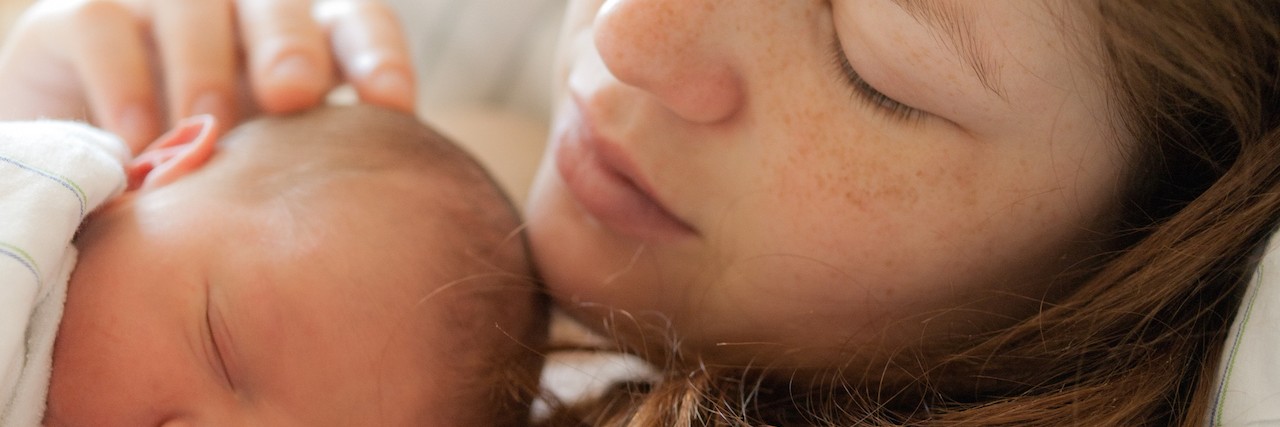The Thoughts I Had After Having a Baby Didn't Make Me a Monster
Editor’s note: The following piece discusses intrusive thoughts. If you experience similar thoughts, there is help. Visit the International OCD Foundation for information about how to get support.
One afternoon in January 2013, I gave birth to a beautiful daughter. She was five weeks early and small, but healthy. I was overjoyed to be her mother. My husband and I entered a state of bliss, marveling at her every move.
That night, as we tried to rest, I had a peculiar thought: what if I were to throw my daughter down the spiral staircase in our home? Ashamed, I confessed the thought to the nurse on duty. She kindly suggested I was exhausted from labor and should get some sleep. She would take care of our baby for the night. The next day, a social worker visited us and became the first of many professionals to help me understand what I came to know as postpartum obsessive-compulsive disorder, or PPOCD.
During my daughter’s first year, I bonded deeply with her. At the same time, I intermittently had scary thoughts about harming her or myself.
My fears were initially prompted by that spiral staircase, a feature I used to enjoy but which became the center of my dark obsessions. Each time I climbed it, even when I was not holding my baby, I imagined myself dropping her over the edge.
Another trigger was knives. Even harmless butter knives could cause piercing worry. Once, in a restaurant, the butter knife at my husband’s plate was pointed in our daughter’s direction. I felt a surge of anxiety and moved the knife to the other side of the table, even as I told myself it could not possibly hurt her. My fear became so irrational, even objects that resembled the shape of a knife, like the head of an electric toothbrush, or objects near a knife, would cause waves of paranoia.
Everyday life became sinister. Once, my daughter was laying on the rug, my husband and I on the couch. She was giggling as he wiggled his toes to amuse her. I was laughing, too, but inside felt a sickening fear that I would lose control of my feet and stomp on her.
Terrified, I tried to counter these kinds of thoughts with repetitive behaviors, phrases, images and positive anecdotes — coping mechanisms common of PPOCD.
Unlike postpartum depression, PPOCD is not widely known. According to the OCD Center of Los Angeles, it affects only about three to five percent of postpartum women. Authors and psychologists Kevin Gyoerkoe, Laura Miller and Pamela Wiegartz report that about 90 percent of new mothers and fathers experience violent or scary “intrusive thoughts.”
These unsettling thoughts are not a sign of bad parenting. Rather, they emerge from the overzealous care that sometimes accompanies early parenthood, a product of a mind constantly scanning for danger. Sleep deprivation increases the likelihood of such thoughts. The difference for mothers and fathers with PPOCD, however, is the intensity and frequency of the scary thoughts, as well as the panic that accompanies them.
Because I pictured myself doing monstrous things, I began to wonder if I was a monster. I felt an almost unbearable shame. Psychologists assured me I was not a danger and that with treatment, I would get better.
Around my daughter’s first birthday, the intrusive thoughts and anxiety began to subside, finally fading almost completely.
After my recovery, I processed my PPOCD experience by writing a string quartet, called “String Quartet OCD.” With music as my language, I traced the arc of my story from PPOCD’s first manifestations through recovery, and the lingering memories from that time. With “String Quartet OCD,” I make peace with my journey.
Because PPOCD is not often discussed in the media, mothers who experience it often have no reference for their suffering. They believe if they tell someone, they will be marginalized and their child will be taken away. Thus, many women do not seek treatment. I was fortunate to receive excellent care, including medication, therapy and a support group at the Healthy Expectations Program for Perinatal Mental Health at Children’s Hospital Colorado.
I felt rudderless when I first experienced symptoms, and want others to know that you are not alone. There is a network of resources and trained providers who can help mothers and fathers suffering from extreme anxiety or OCD following the birth of a child. Organizations like Postpartum Progress and Postpartum Support International can assist you in finding the help you need.
We all go through life changed by our suffering. PPOCD changed me for the better by giving me a greater understanding of fear and compassion for myself and all who are afraid. I hope that by sharing my story and music, I can bring some measure of comfort to others suffering from crippling postpartum anxiety.
For more information about Loretta’s journey and work, visit her site.

